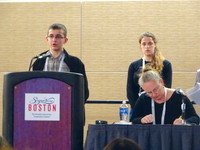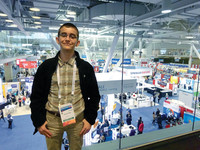Sandra Lisi Savella, librarian at Aldrich Junior High School, said she will do just about anything to get a student interested in reading; for some students though, like 8th grader Christian Tanguay, …
This item is available in full to subscribers.
We have recently launched a new and improved website. To continue reading, you will need to either log into your subscriber account, or purchase a new subscription.
If you are a current print subscriber, you can set up a free website account by clicking here.
Otherwise, click here to view your options for subscribing.
Please log in to continue |
|


Sandra Lisi Savella, librarian at Aldrich Junior High School, said she will do just about anything to get a student interested in reading; for some students though, like 8th grader Christian Tanguay, the desire to read is already strong.
Tanguay said he has always been an avid reader. He reads every night before bed and often starts and finishes a book in just a few hours, unable to put the book down.
When Savella, a member of the American Association of School Librarians (AASL), a chapter of the American Library Association (ALA), received an alert that the ALA’s midwinter conference, held in Boston, was looking for young and “voracious” readers she immediately thought of Tanguay.
The ALA wanted students to partake in YALSA, the Young Adult Library Services Association’s Best Fiction for Young Adults Teen Feedback Session on Saturday, January 9.
This conference asked teens to help narrow the list to the top ten by presenting their own perspective on the books that had come out in the past year.
When Tanguay went through the list he had already read nearly 14 of the titles and was a perfect candidate for the conference, having a wide range of experience with the texts. Both he and Savella traveled to Boston for the event.
The conference, at the Boston Convention and Exhibition Center, was a daylong event where not only Tanguay spoke in front of the YALSA Committee but had lunch with the nominated authors and tour upwards of 200 exhibits from publishers, authors, libraries, tech companies and more.
Tanguay ended up taking home 54 books for free, two of them hardcover and another three signed by the authors along with 30 pens.
“There was just so much to do, to see and to take away from this,” Tanguay said.
His two favorite books from the list are I Crawl Through It by A.S. King and Denton Little’s Death Date by Lance Rubin, which he suggested be on the final top 10 list.
Savella said that both she and Tanguay were able to have “intimate” conversations with the present authors.
“They were so interested in talking to the kids,” she said. “This is their audience, this is who they write for. There were so many talented people who just wanted to know exactly what their readers were thinking.”
Savella argues young adult writers are in danger of losing readers because with so many distractions available, young readers are “giving up on reading too easily.”
She notes that if students need more encouragement than ever to read they often leave a book if not captivated in the first few chapters.
She believes a lot of new authors weigh their work down in too much detail too early on, trying to set up the perfect back-story before getting into the action of the novel.
“If only they just kept with it, I know they would like it, but you got to grab their attention on the first page,” Savella said.
She did say though that there are some students who will come back to a book they had given up, eager to know what eventually happens to the characters and the ending.
Those students who do enjoy reading, such as Tanguay, are the best way to urge other students, Savella believes. They can share their favorite books, they can discuss texts as they read along and this makes it exciting for those students who may not naturally gravitate to reading.
Both Savella and Tanguay stressed that reading is critical for young students’ future success. Tanguay said one’s youth is the time to read, before there are work and other adult responsibilities.
“This is the time to do it,” he said. “There’s more distractions today, but I think all kids benefit from reading. It makes you perform better in a lot of areas, plus it’s fun.”
Savella said not only does reading improve vocabulary and a student’s general performance in the classroom, but it also expands any student’s future opportunities and “opens doors to great futures.”
She said that the brain works like a muscle and without regular reading “practice” students won’t improve. She believes that the adults in children’s lives should “raise the bar” and challenge children to read more.
For more information on the ALA or the YALSA conference and the books nominated for the top 10 Best Fiction for Young Adults visit www.ala.org/yalsa/teenstopten.
Comments
No comments on this item Please log in to comment by clicking here